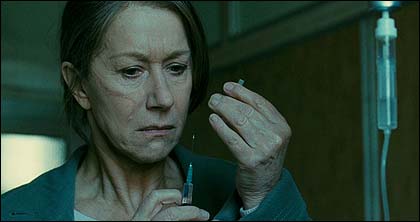
Pay Up
Secrets and lies in East Berlin
by Molly Templeton
THE DEBT: Directed by John Madden. Written by Matthew Vaugn, Jane Goldman and Peter Straughan, based on the film Ha-Hov, written by Assaf Bernstein and Ido Rosenblum. Cinematography, Ben Davis. Editor, Alexander Berner. Music, Thomas Newman. Starring Helen Mirren, Jessica Chastain, Sam Worthington, Marton Csokas, Tom Wilkinson and Ciarán Hinds. Focus Features, 2011. R. 114 minutes. Three Stars.
 |
| Helen Mirren in The Debt |
For every Shakespeare in Love, with its multiple Oscars and love from almost all corners (barring this one), director John Madden also has a Proof, a tiring and underwhelming adaptation. For every Her Majesty, Mrs. Brown, for which Judi Dench should have won an Oscar, he’s got a Killshot, a movie I actually forgot existed.
The Debt sits somewhere in the middle. A gracefully structured thriller that moves easily between different timelines, it has the feel of something that exists only in the universe of film and bears little relation to reality or the events it refers to for its plot. The structure is hung with clichés, and rather than being a film with underlying themes about truth, power and the dangers of choosing honor over honesty, it’s a film about cinematic love triangles, inexperienced kidnappers and excellent actors turning in nice performances in mediocre films.
The Debt’s two main timelines run in 1997, where a young writer is celebrating the release of her book, and 1966, when the book’s events take place: Three young Mossad agents go to East Berlin on a mission to capture a Nazi war criminal. The small team consists of the Hotheaded, Ambitious Leader, Stephan (Marton Csokas, who ages into Tom Wilkinson); the Silent, Steady One, David (Sam Worthington, growing up to be Ciarán Hinds); and the Hot Newbie, Rachel (Jessica Chastain and Helen Mirren). Rachel is so attractive that even David, whom Stephan has never seen notice a woman, is drawn to her, but David is too honorable to act. Stephan is less so.
Their plans go right and go wrong to various degrees as the movie flashes between the years. The Debt’s strength lies in the way the screenplay often makes clear what is going to happen without showing how it will happen. The instant the elder Rachel stands to read a chapter from her daughter’s account of this historic mission, discomfort is clear in Mirren’s taut face and shoulders. The official story doesn’t match something in her head, and the film takes a clever enough route as it explores this long-held secret.
It also takes a long detour into a tiresome and frustrating thriller subplot involving trained agents who let their captive get to them. Add to this a dash of character clichés — Rachel is more gentle with their captive, and also more emotional; David, usually so stoic, is suddenly easily goaded into violence — and you have a soggy second act. The film is also peculiarly disengaged from the fresh hell it puts Rachel through: Their target has established himself as a gynecologist, so Rachel poses as a would-be mother, with all necessary exams. Though this puts Rachel at the center of the plan and the film, no one ever seems to think twice about the trauma of the situation, making the entire thing feel more an exercise in cinematic plotting than an engaging narrative device.
That feeling dogs The Debt from the start. Maybe it’s the odd casting (the square-faced guy from Avatar growing up into hangdog Ciarán Hinds? Helen Mirren as a secret agent again?); maybe it’s the overly familiar timing that has secrets coming to light just as the relevant book sees publication; maybe it’s the strange feeling of disengagement between the story and its subject matter. Though the focus of the mission is a Nazi, the film’s relationship to the reality of WWII is so tenuous that this war criminal could’ve been any stock bad guy. The Debt is a chess game being played by two computers: The moves are executed precisely, but with no surprises, no human element, little creativity and no heart.